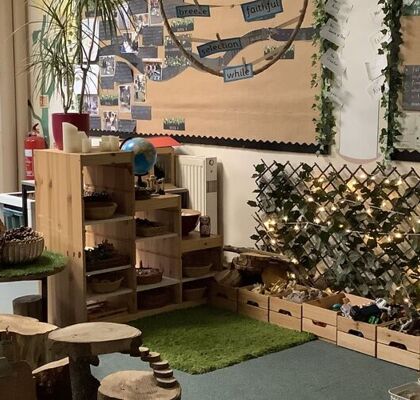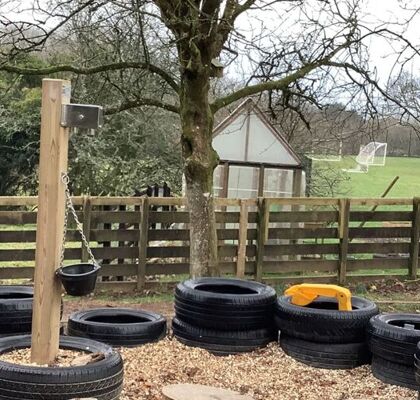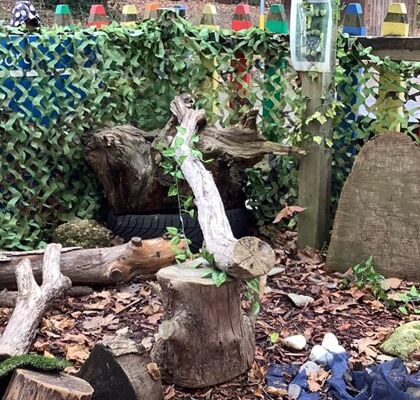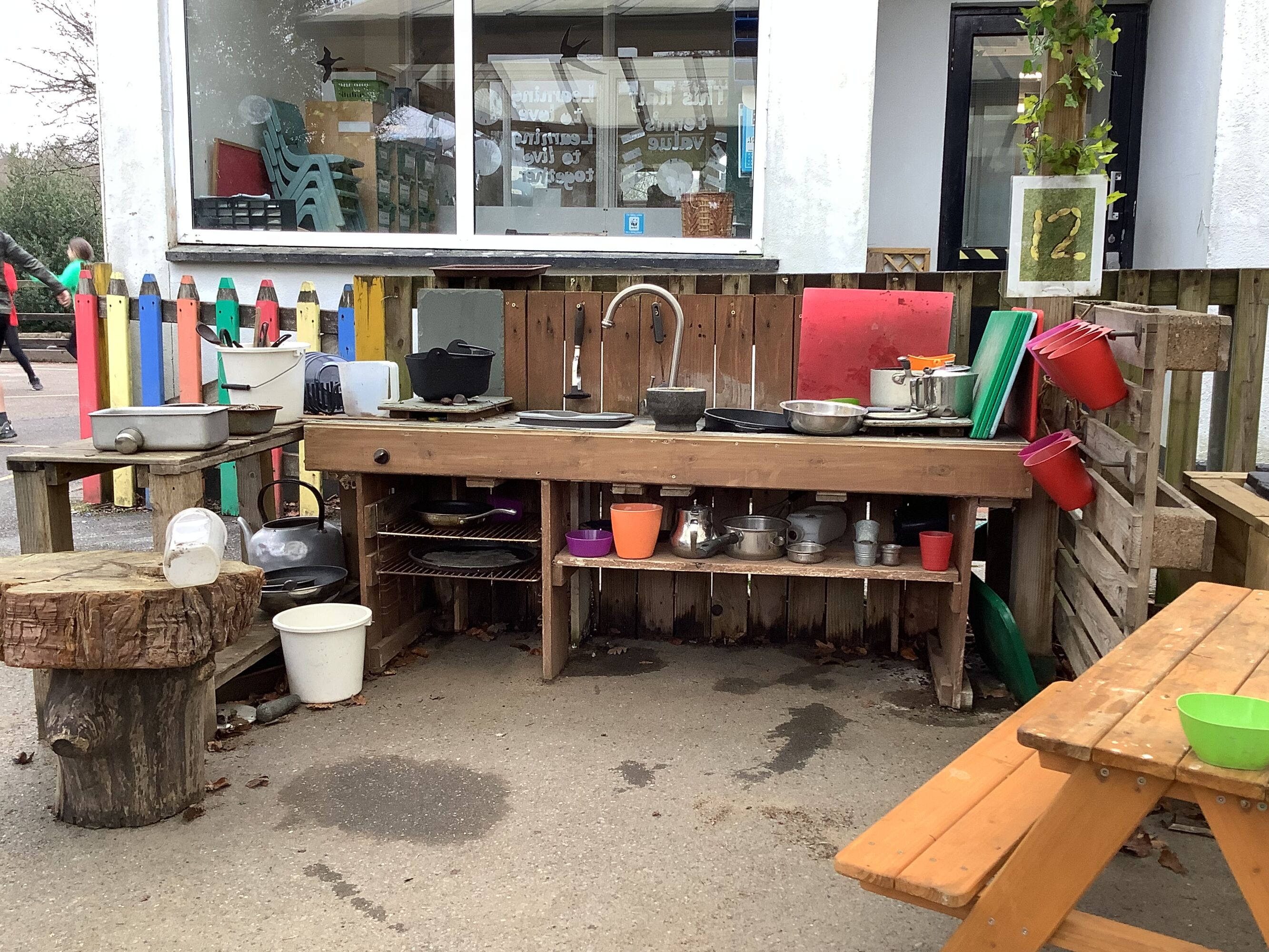- Home
- School Life
- Subjects
- Early Years
Early Years
Meavy CofE Primary School EYFS Long Term plan 2024-2025
Meavy CofE Primary School Starting School Booklet for Parents and Carers 2024-2025
Intent
Within our Early Years Classroom the curriculum is designed to recognise children’s prior learning from previous settings and their experiences at home. We respect that children have different starting points and we strive to provide a nurturing environment for all. We do this through providing a range of child led, hands on learning opportunities.
We believe that the ability to learn is underpinned by the teaching of basic skills, knowledge, concepts and values. As such we provide many first hand experiences to underpin the children’s knowledge, with the aim of broadening their understanding of the world around them.
We believe that our first experiences of school should be happy and positive, enabling us to develop a lifelong love of learning. In order to provide this climate we use positive language to build a positive sense of self.
We recognise that feeling safe and belonging allow children and adults to do their best work and we endeavour to create an environment where everyone feels comfortable and confident. We are committed to providing a genuine foundation for lifelong learning.
We provide an environment which will enable children to trust in themselves and in their peers, building resilience, ambition and integrity.
Implementation
Across our EYFS, we follow the Framework for the Early Years Foundation Stage and the New Development Matters: Non Statutory Curriculum Guidance.
This Framework and Guidance specifies the requirement for learning and development in the Early Years and provides prime and specific areas of learning to be covered in our curriculum.
Prime Areas :Communication and Language, Physical Development and Personal, Social and Emotional Development
Specific Areas : Literacy , Mathematics , Understanding the World and Expressive Arts and Design
During the autumn term, children focus on the prime areas. These form the foundation of a child’s learning. Once the children are secure in these areas they will begin to work on the specific areas of learning. The children are encouraged to follow their personal interests and explore the world around them. We are proud of our rich learning environment and are pleased to be able to offer the children a wide range of activities to promote their love of learning.
We take a hands on approach to all learning and the children particularly enjoy planting,
building with logs, tyres and planks, making potions, pies and cakes in our mud kitchen and exploring the properties of water in the indoor and outdoor water areas.
We plan a broad and balanced curriculum which provides children with a range of first-hand experiences and opportunities to get out into the local community. We draw on our wider school community to give our children rich, memorable learning opportunities - what better way to learn about animals and their young than by our own children bringing in the lambs they are hand rearing to introduce to their friends!
Throughout heir time in Reception, we place a strong focus on early reading and writing and the development of mathematics. The school follows the Little Wandle phonic programme. Every child has access to a teacher taught phonics session every day, reading groups three times a week and additional daily intervention opportunities for those who find this area of learning more difficult.
Observation, planning and assessment
Development matters 2021: Assessment is about noticing what children can do and what they know. It is not about lots of data and evidence. Before assessing children, it’s a good idea to think about whether the assessments will be useful. Assessment should not take practitioners away from the children for long periods of time.
Statutory Framework for Early Years 2021: Assessment should not entail prolonged breaks from interaction with children, nor require excessive paperwork. When assessing whether an individual child is at the expected level of development, practitioners should draw on their knowledge of the child and their own expert professional judgement and should not be required to prove this through collection of physical evidence.
Through our knowledge of each child and formative assessments the EYFS team plan exciting and engaging activities that will move the children’s learning forward. This involves following a class theme where we take advantage of cross curricular links in order to combine transferable skills and develop a wide -ranging vocabulary which underpins the children’s learning.
This may include following individual children’s interests and making the most of those focused moments where the teaching and learning can be maximised in a one to one way with teacher and child.
Each year creates its own unique blend of whole class, guided, adult directed play and child-initiated play activities dependent on the nature and needs of the class of individuals.
Impact
The impact of our curriculum is measured by assessment procedures which allow us to measure outcomes against all schools nationally.
We measure the percentage of pupils achieving a ‘expected level of development’ by the end of the Reception year.
The impact of our curriculum will also more importantly, be measured by how effectively it helps our pupils develop into well rounded individuals who embody our values and carry with them the knowledge, skills and attitudes which will make them lifelong learners and valuable future citizens.
We aim to instil a sense of awe and wonder into every child. Making them curious and inquisitive about the world in which they are living. We want our children to ask questions, to dream big and most of all, to recognise the potential within themselves.
When children leave our Foundation Stage Class, we not only endeavour for them to be Year One ready, but well-rounded individuals with positive attitudes towards learning for life.
The team in EYFS work tirelessly to ensure that children are surrounded by a kind, caring and happy environment which helps t hem develop the same skills in their journey through school.
They listen and respond to children, model and extend language, support their independence and confidence, enable them to solve problems, take risks and express their needs and respond to personal needs with professionalism and understanding at all times. It is a joyous place to be where resilience, perseverance and successes are celebrated and every child feels valued and respected.
High Quality Interactions - The ShREC approach
High quality interactions - every child, every day
When interacting with children, at Meavy we have adopted the ‘ShREC’ approach to engage children in high quality interactions.
When we interact and learn alongside children, we
- Sh Share Attention,
- R Respond,
- E Expand
- C have a conversation’.
We share attention by showing a genuine interest in what a child or group of children are doing and establish we need to interact and support with children’s play to move learning forward. We respond to the children’s spoken language, make links and support them with their learning and behaviours that they are displaying.
Finally, expand their thoughts and ideas through conversation so that we can support the children to solve their own problems within their play through carefully selected questioning and prompts.
Our Learning Environment
The learning environment in EYFS is engaging and enabling. We work hard to create spaces both inside and outside where our children thrive.
We want our children to be interested and motivated by the resources on offer so that they will explore, refine their thinking and develop their skills. This also helps children to feel valued and that they are important, which is vital for building self-esteem.
We know that open-ended resources provide greater learning opportunities. Careful thought leads to an environment that meets a range of developmental needs. As our children grow and learn so our environment flexes and adapts to meet them, providing just the right amount of challenge.
Our environment is carefully constructed so that children can access resources and materials that will help them consolidate learning as well as taking managed risks.
Having open ended resources can also be used flexibly, so that children can communicate their thoughts. Resources are able to be used flexibly and to travel from one area of continuous provision to another so they can be combined so that children can see through their ideas to their own finishing point.
Above all our classroom is a joyful and nurturing space where children are able to play, explore and learn.



